小学一般过去式句型转换
小学一般过去式句型转换 (1)
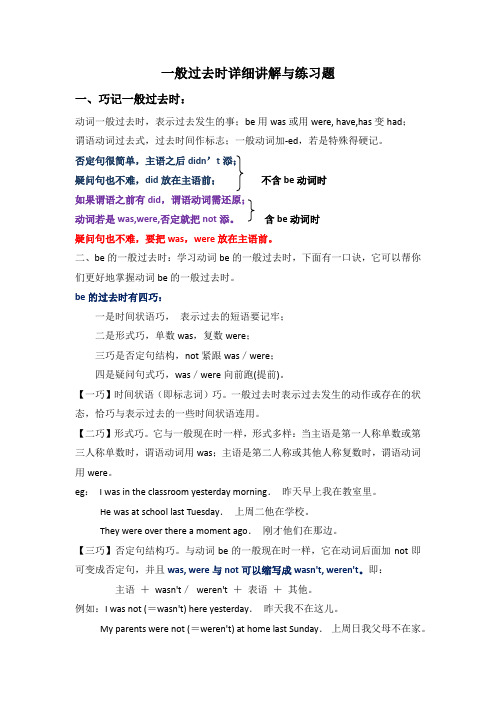
一般过去时详细讲解与练习题一、巧记一般过去时:动词一般过去时,表示过去发生的事;be用was或用were, have,has变had;谓语动词过去式,过去时间作标志;一般动词加-ed,若是特殊得硬记。
否定句很简单,主语之后didn’t添;疑问句也不难,did放在主语前;不含be动词时如果谓语之前有did,谓语动词需还原;动词若是was,were,否定就把not添。
含be动词时疑问句也不难,要把was,were放在主语前。
二、be的一般过去时:学习动词be的一般过去时,下面有一口诀,它可以帮你们更好地掌握动词be的一般过去时。
be的过去时有四巧:一是时间状语巧,表示过去的短语要记牢;二是形式巧,单数was,复数were;三巧是否定句结构,not紧跟was/were;四是疑问句式巧,was/were向前跑(提前)。
【一巧】时间状语(即标志词)巧。
一般过去时表示过去发生的动作或存在的状态,恰巧与表示过去的一些时间状语连用。
【二巧】形式巧。
它与一般现在时一样,形式多样:当主语是第一人称单数或第三人称单数时,谓语动词用was;主语是第二人称或其他人称复数时,谓语动词用were。
eg:I was in the classroom yesterday morning.昨天早上我在教室里。
He was at school last Tuesday.上周二他在学校。
They were over there a moment ago.刚才他们在那边。
【三巧】否定句结构巧。
与动词be的一般现在时一样,它在动词后面加not即可变成否定句,并且was, were与not可以缩写成wasn't, weren't。
即:主语+wasn't/weren't +表语+其他。
例如:I was not (=wasn't) here yesterday.昨天我不在这儿。
My parents were not (=weren't) at home last Sunday.上周日我父母不在家。
一般过去时态句型转换方法归纳
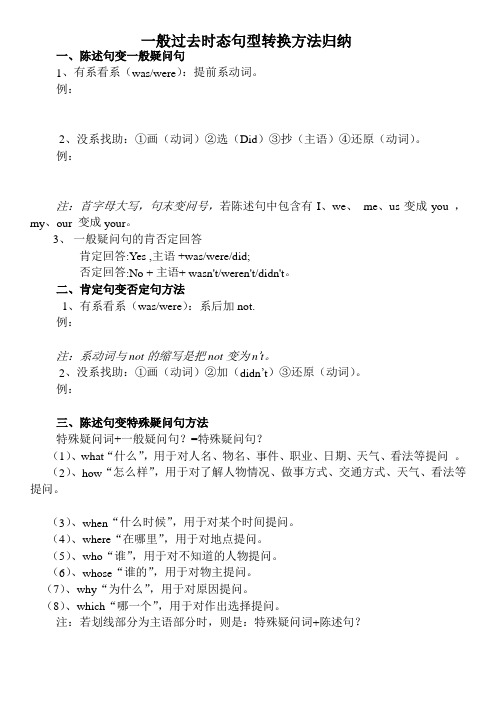
一般过去时态句型转换方法归纳
一、陈述句变一般疑问句
1、有系看系(was/were):提前系动词。
例:
2、没系找助:①画(动词)②选(Did)③抄(主语)④还原(动词)。
例:
注:首字母大写,句末变问号,若陈述句中包含有I、we、me、us变成you ,my、our 变成your。
3、一般疑问句的肯否定回答
肯定回答:Yes ,主语 +was/were/did;
否定回答:No + 主语+ wasn't/weren't/didn't。
二、肯定句变否定句方法
1、有系看系(was/were):系后加not.
例:
注:系动词与not的缩写是把not变为n’t。
2、没系找助:①画(动词)②加(didn’t)③还原(动词)。
例:
三、陈述句变特殊疑问句方法
特殊疑问词+一般疑问句?=特殊疑问句?
(1)、what“什么”,用于对人名、物名、事件、职业、日期、天气、看法等提问。
(2)、how“怎么样”,用于对了解人物情况、做事方式、交通方式、天气、看法等提问。
(3)、when“什么时候”,用于对某个时间提问。
(4)、where“在哪里”,用于对地点提问。
(5)、who“谁”,用于对不知道的人物提问。
(6)、whose“谁的”,用于对物主提问。
(7)、why“为什么”,用于对原因提问。
(8)、which“哪一个”,用于对作出选择提问。
注:若划线部分为主语部分时,则是:特殊疑问词+陈述句?。
超详细一般过去时的全面讲解【附练习与答案】
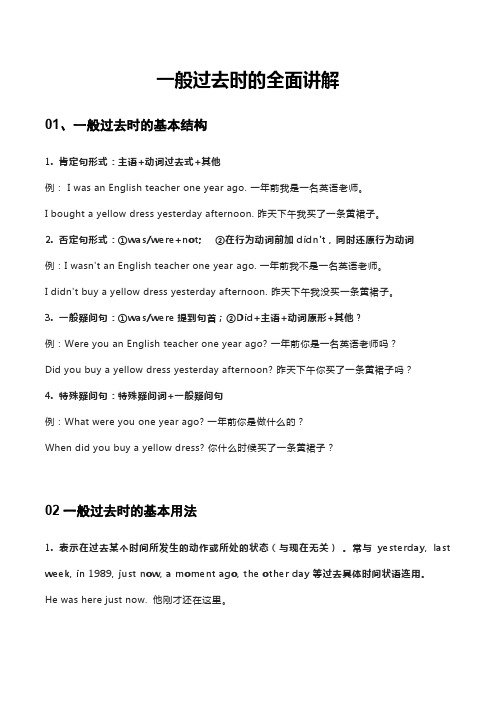
一般过去时的全面讲解01、一般过去时的基本结构1. 肯定句形式:主语+动词过去式+其他例: I was an English teacher one year ago. 一年前我是一名英语老师。
I bought a yellow dress yesterday afternoon. 昨天下午我买了一条黄裙子。
2. 否定句形式:①was/were+not; ②在行为动词前加didn't,同时还原行为动词例:I wasn't an English teacher one year ago. 一年前我不是一名英语老师。
I didn't buy a yellow dress yesterday afternoon. 昨天下午我没买一条黄裙子。
3. 一般疑问句:①was/were提到句首;②Did+主语+动词原形+其他?例:Were you an English teacher one year ago? 一年前你是一名英语老师吗?Did you buy a yellow dress yesterday afternoon? 昨天下午你买了一条黄裙子吗?4. 特殊疑问句:特殊疑问词+一般疑问句例:What were you one year ago? 一年前你是做什么的?When did you buy a yellow dress? 你什么时候买了一条黄裙子?02一般过去时的基本用法1. 表示在过去某个时间所发生的动作或所处的状态(与现在无关)。
常与yesterday, last week, in 1989, just now, a moment ago, the other day等过去具体时间状语连用。
He was here just now. 他刚才还在这里。
What did you do yesterday? 你昨天做了什么事?2. 在过去一段时间内的经常性或习惯性动作。
小学一般过去式句型转换1
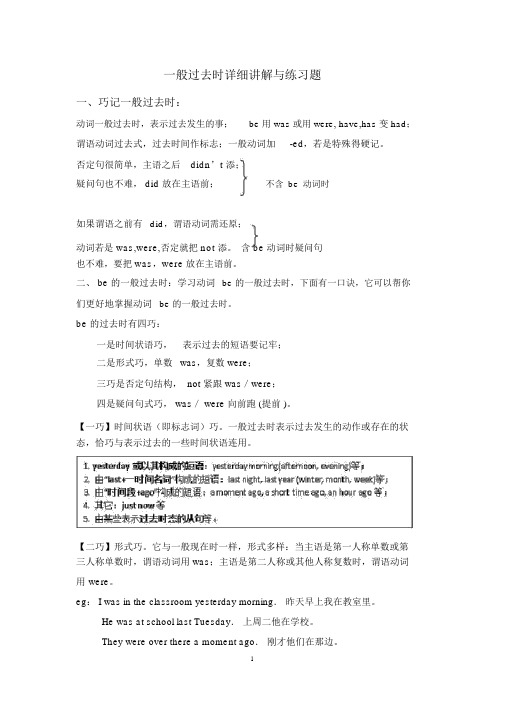
一般过去时详细讲解与练习题一、巧记一般过去时:动词一般过去时,表示过去发生的事;be 用 was 或用 were, have,has 变 had;谓语动词过去式,过去时间作标志;一般动词加-ed,若是特殊得硬记。
否定句很简单,主语之后didn’t 添;疑问句也不难, did 放在主语前;不含be动词时如果谓语之前有did,谓语动词需还原;动词若是 was,were,否定就把 not 添。
含 be 动词时疑问句也不难,要把 was,were 放在主语前。
二、 be 的一般过去时:学习动词be 的一般过去时,下面有一口诀,它可以帮你们更好地掌握动词be 的一般过去时。
be 的过去时有四巧:一是时间状语巧,表示过去的短语要记牢;二是形式巧,单数was,复数 were;三巧是否定句结构, not 紧跟 was/were;四是疑问句式巧, was/ were 向前跑 (提前 )。
【一巧】时间状语(即标志词)巧。
一般过去时表示过去发生的动作或存在的状态,恰巧与表示过去的一些时间状语连用。
【二巧】形式巧。
它与一般现在时一样,形式多样:当主语是第一人称单数或第三人称单数时,谓语动词用 was;主语是第二人称或其他人称复数时,谓语动词用were。
eg: I was in the classroom yesterday morning.昨天早上我在教室里。
He was at school last Tuesday.上周二他在学校。
They were over there a moment ago.刚才他们在那边。
【三巧】否定句结构巧。
与动词 be 的一般现在时一样,它在动词后面加 not 即可变成否定句,并且 was, were与 not 可以缩写成 wasn't, weren't。
即:主语+ wasn't/ weren't +表语+其他。
例如: I was not (=wasn't) here yesterday.昨天我不在这儿。
小学一般过去时
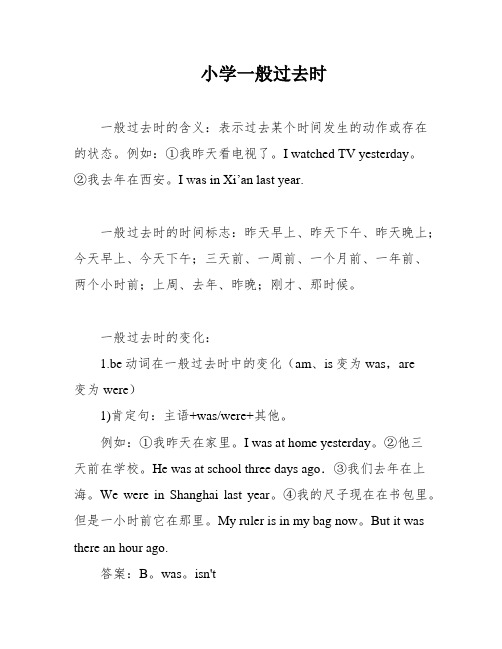
小学一般过去时一般过去时的含义:表示过去某个时间发生的动作或存在的状态。
例如:①我昨天看电视了。
I watched TV yesterday。
②我去年在西安。
I was in Xi’an last year.一般过去时的时间标志:昨天早上、昨天下午、昨天晚上;今天早上、今天下午;三天前、一周前、一个月前、一年前、两个小时前;上周、去年、昨晚;刚才、那时候。
一般过去时的变化:1.be动词在一般过去时中的变化(am、is变为was,are变为were)1)肯定句:主语+was/were+其他。
例如:①我昨天在家里。
I was at home yesterday。
②他三天前在学校。
He was at school three days ago.③我们去年在上海。
We were in Shanghai last year。
④我的尺子现在在书包里。
但是一小时前它在那里。
My ruler is in my bag now。
But it was there an hour ago.答案:B。
was。
isn't⑤我的笔十分钟前在桌子上。
但是现在它不在那里了。
My pen was on my desk ten minutes ago。
But it isn't there now.答案:A。
is。
wasn't2)否定句:主语+was/were+not+其他。
在was/were后加not,was not=wasn't;were not=weren't。
例如:①我昨天不在家里。
I wasn't at home yesterday。
②他三天前不在学校。
He wasn't at school three days ago.3.We were not in Shanghai last year。
(3) General ns: Did/ Were + subject + others。
六年级一般过去时句型变换
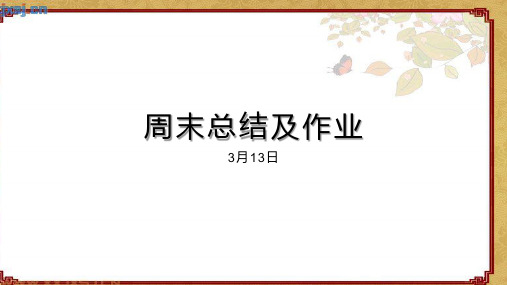
我上周末没看电视。
三、 一般疑问句“Did+主语+动词原形+其他 I watched TV last night.(变为一般疑问句) ----Did you watch TV last night?
肯定回答为 Yes,主语+did,否定回答为“No, 主语+didn't,
如:Yes,I did. / No,I didn't
2、He saw a film yesterday.(变为否定句) He didn't ssaewe a film yesterday
3、I played football this morning. (变为一般疑问句 ,并作肯定回答) Did you I played football this morning ?
周末总结及作业
3月13日
学过的不规则动词过去式
am is--was are--were do--did have has--had
是
是
助动词
有、吃
go--went read--read hurt--hurt can--cound
去
读
弄伤
能
see--saw drink--drank sleep--slept fall--fell
四、特殊疑问句:特殊疑问词+一 般疑问句? What did you do last weekend?
When did you watch TV?
Where did you go last weekend?
How did you go to school?
句型转换
1、Mary does her homework everyday. (用last night改写句子)。 Mary did her homework last night
小学六年级英语一般过去式语法知识点

小学六年级英语一般过去式语法知识点2)Be动词在一般过去时中的变化:am和is在一般过去时中变为was。
am,is----wasare在一般过去时中变为were。
3)动词过去式变化规则:1.一般在动词末尾加-ed,如:point-pointed,shout-shouted2.以不发音的e结尾加-d,如:like-likedlive-lived4)过去式“-ed”的发音规则1)动词词尾为“t,d”时,发/ id /音,want →wanted(要)need →needed(需要)(2)动词词尾为清辅音时,发/ t /音。
help →helped(帮助)laugh →XXX(笑)look →looked(看)kiss →kissed(吻)wash →washed(洗)(3)动词词尾为t,d以外之浊辅音或元音时,发/ d /音。
call→called(叫)stay→stayed(停留)cry→cried(哭)1)一般过去时时间标志语long longago(很久以前)。
one day(有一天),yesterday(昨天),last night(昨晚)。
three days ago(三天前)。
2)Be动词在一般过去时中的变化:am和XXX在普通曩昔时中变为was。
am,is----wasare在普通曩昔时中变为were。
3)动词过去式变化规则:1.普通在动词末尾加-ed,如:point-pointed,shout-shouted2.以不发音的e结尾加-d,如:like-likedlive-lived4)曩昔式“-ed”的发音划定规矩1)动词词尾为“t,d”时,发/ id /音,want →wanted(要)need →needed(需求)(2)动词词尾为清子音时,发/ t /音。
help →helped(帮助)laugh →XXX(笑)look →looked(看)kiss →kissed(吻)wash →washed(洗)(3)动词词尾为t,d以外之浊子音或元音时,发/ d /音。
小学一般过去式句型转换
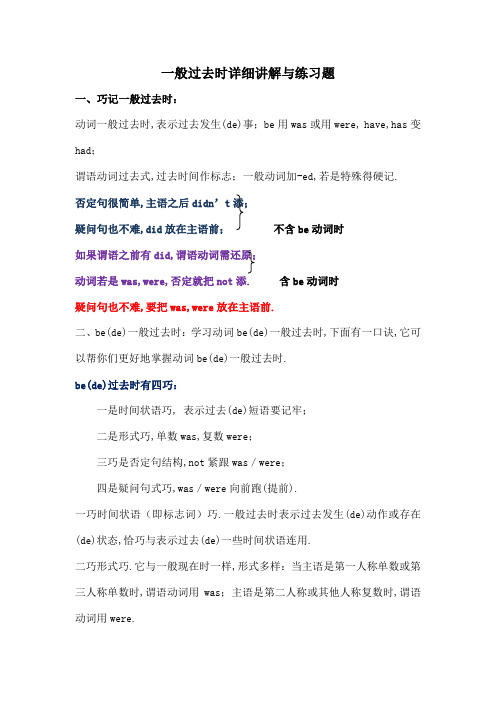
一般过去时详细讲解与练习题一、巧记一般过去时:动词一般过去时,表示过去发生(de)事;be用was或用were, have,has变had;谓语动词过去式,过去时间作标志;一般动词加-ed,若是特殊得硬记.否定句很简单,主语之后didn’t添;疑问句也不难,did放在主语前;不含be动词时如果谓语之前有did,谓语动词需还原;动词若是was,were,否定就把not添. 含be动词时疑问句也不难,要把was,were放在主语前.二、be(de)一般过去时:学习动词be(de)一般过去时,下面有一口诀,它可以帮你们更好地掌握动词be(de)一般过去时.be(de)过去时有四巧:一是时间状语巧, 表示过去(de)短语要记牢;二是形式巧,单数was,复数were;三巧是否定句结构,not紧跟was/were;四是疑问句式巧,was/were向前跑(提前).一巧时间状语(即标志词)巧.一般过去时表示过去发生(de)动作或存在(de)状态,恰巧与表示过去(de)一些时间状语连用.二巧形式巧.它与一般现在时一样,形式多样:当主语是第一人称单数或第三人称单数时,谓语动词用was;主语是第二人称或其他人称复数时,谓语动词用were.eg: I was in the classroom yesterday morning.昨天早上我在教室里.He was at school last Tuesday.上周二他在学校.They were over there a moment ago.刚才他们在那边.三巧否定句结构巧.与动词be(de)一般现在时一样,它在动词后面加not即可变成否定句,并且was, were与not可以缩写成wasn't, weren't.即:主语+ wasn't/ weren't +表语+其他.例如:I was not (=wasn't) here yesterday.昨天我不在这儿.My parents were not (=weren't) at home last Sunday.上周日我父母不在家.四巧疑问句式巧.把was, were提到句首,句末用问号即可变为一般疑问句.即:Was(Were) +主语+表语+其他这恰巧与动词be(de)一般现在时(de)疑问句式相似.例如:Were you at home the day before yesterday﹖前天你在家吗 Was she late this morning﹖今天早上她迟到了吗更巧(de)是疑问句(de)答语也相似,肯定回答用“Yes, 主语+was/were.”;否定回答用“No,主语+wasn't/weren't.”.eg:—Were Wei Hua and Han Mei here just now﹖刚才魏华和韩梅在这儿吗—Yes, they were. (No, they weren't.) 是(de),她们在.(不,她们不在.)动词过去式变化规则:1.一般在动词末尾加-ed,如:pull-pulled, cook-cooked2.结尾是e加d,如:taste-tasted3.末尾只有一个元音字母和一个辅音字母(de)重读闭音节,应双写末尾(de)辅音字母,再加-ed,如:stop-stopped4.以“辅音字母+y”结尾(de),变y为i, 再加-ed,如:study-studied 5.不规则动词过去式:am,is-was are-were do-did see-saw say-said give-gave get-got go-went come-came have-had eat-ate take-took run-ran sing-sang put-put make-made read-read write-wrote draw-drew drink-drank fly-flew ride-rode speak-spoke sweep-swept swim-swam sit-sat一、句型转换1. The children had a good time in the park.否定句: __________________________________________一般疑问句: __________________________________________对划线部分提问:__________________________________________2. There were about nine hundred people at the concert.(音乐会)否定句: __________________________________________一般疑问句: __________________________________________对划线部分提问:__________________________________________3. Ann did her homework yesterday evening.否定句: __________________________________________ 一般疑问句: __________________________________________ 对划线部分提问:__________________________________________ 4. Last week I read an English book.否定句: __________________________________________ 一般疑问句: ___________________________________________ 肯定/否定回答: __________________________________________ 对划线部分提问:__________________________________________ 5. My brother was in the park just now.否定句: __________________________________________ 一般疑问句: __________________________________________ 肯定/否定回答:___________________________________________ 对划线部分提问:____________________________________6. She had some bread for lunch yesterday.否定句:__________________________________________一般疑问句:________________________________________肯定/否定回答:____________________________________对划线部分提问:____________________________________7. They read English last night.否定句:__________________________________________一般疑问句:________________________________________肯定/否定回答:____________________________________对划线部分提问:____________________________________8. I was born in 2007.否定句:_____________________________________________一般疑问句:_________________________________________对划线部分提问:_____________________________________二、写出下列动词(de)过去式Is_______ are ________have _________want _______hear________Sit_______ watch _______play ______ enjoy _______do________ study ______dance _______like_______ live ________go ______buy ______ eat______ get _______ walk ______take______put _______run______ come_______ become________ fly________swim_______ find _______ begin______三、请用正确动词形式填空.1. I _________ (have) an exciting party last weekend.2. _________ she _________(practice) her guitar yesterday No, she _________.3. What ________ Tom ________ (do) on Saturday eveningHe ________(watch) TV and __________(read) an interesting book.4. They all _________(go) to the mountains yesterday morning.5. She _________(not visit) her aunt last weekend.She ________ (stay) at home and _________(do) some cleaning.6. When ________ you _________(write) this song I __________(write)it last year.7. My friend, Carol, ________(study) for the math test and ________(practice) English last night.8. ________ Mr. Li __________(do) the project on Monday morning Yes, he _________.9. How _________(be) Jim's weekend It _________(be not) bad.10. ________ (be) your mother a sales assistant last year No. she __________.四、改错题.1.How is Jane yesterday _____________________2.He go to school by bus last week. ____________________________ 3.He often goes home at 6:00 last month. _______________________ 4.I can fly kites seven years ago. ______________________________ 5.Did you saw him just now __________________________________ 6.Tom wasn’t watch TV last night. ______________________________ 7.I didn’t my homework yesterday. _____________________________ 8.He wait for you three hours ago. ______________________________。
小学英语语法一般过去时的用法
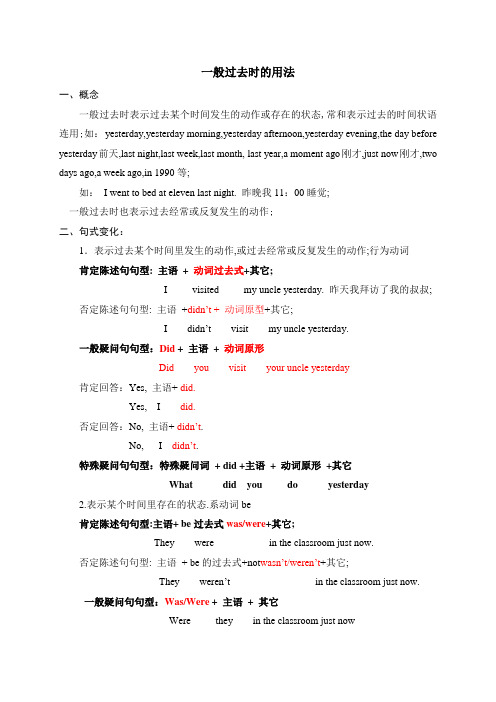
一般过去时的用法一、概念一般过去时表示过去某个时间发生的动作或存在的状态,常和表示过去的时间状语连用;如:yesterday,yesterday morning,yesterday afternoon,yesterday evening,the day before yesterday前天,last night,last week,last month, last year,a moment ago刚才,just now刚才,two days ago,a week ago,in 1990等;如:I went to bed at eleven last night. 昨晚我11:00睡觉;一般过去时也表示过去经常或反复发生的动作;二、句式变化:1.表示过去某个时间里发生的动作,或过去经常或反复发生的动作;行为动词肯定陈述句句型: 主语+ 动词过去式+其它;I visited my uncle yesterday. 昨天我拜访了我的叔叔;否定陈述句句型: 主语+didn’t + 动词原型+其它;I didn’t visit my uncle yesterday.一般疑问句句型:Did + 主语+ 动词原形Did you visit your uncle yesterday肯定回答:Yes, 主语+ did.Yes, I did.否定回答:No, 主语+ didn’t.No, I didn’t.特殊疑问句句型:特殊疑问词+ did +主语+ 动词原形+其它What did you do yesterday2.表示某个时间里存在的状态.系动词be肯定陈述句句型:主语+ be过去式was/were+其它;They were in the classroom just now.否定陈述句句型: 主语+ be的过去式+not wasn’t/weren’t+其它;They weren’t in the classroom just now.一般疑问句句型:Was/Were + 主语+ 其它Were they in the classroom just now肯定回答:Yes, 主语+ was/were.Yes, they were.否定回答:No, 主语+ wasn’t/weren’t.No, they weren’t.特殊疑问句句型:特殊疑问词+ was /were+主语+其它Where were they just now三、动词过去式的构成规律一规则动词的过去式1.以不发音e结尾的动词,在词尾直接加-d;live→lived use→used taste-tasted 2.以“辅音字母+ y”结尾的动词,先将y 改为i ,再加–ed;study→studied, tr y→tried fly→flied3.以重读闭音节即辅音+元音+辅音或r音节结尾,末尾只有一个辅音字母的动词,要先双写这个辅音字母后,再加–ed;stop→stopped ,plan→planned, prefer→preferred4.一般情况下,在动词原形后面加-ed;清辅音后读/t/,浊辅音和元音后读/d/. /t/ 和/d/后读/id/.look→looked play→played start→started visit→visited二不规则动词的过去式am/is---was are—were go-went swim—swam fly---flew do---did have---hadsay---said see---saw take---took come---came get---got draw---drew sing---sang read---read eat---ate tell---told sit---sat let---let cut---cut leave---left think---thought run---ran find---found wear---wore buy---bought write---wrote make---made一、用行为动词的适当形式填空1. He _____ live in Wuxi two years ago.2. The cat ____ eat a bird last night.3. We _____ have a party last Halloween. 5. I _____ make a model ship with Mike yesterday.4. Nancy _____ pick up oranges on the farm last week.6. They _____ play chess in the classroom last PE lesson.7. My mother ____ cook a nice food last Spring Festival.8. The girls _____ sing and _____ dance at the party.9. What _____ she ____ find in the garden last morning She ____ find a beautiful butterfly.10. ____ he ____ the flowers this morning Yes, he _____. water11. ____ you ____ visit your relatives last Spring Festival12. ____ he ____ fly a kite on Sunday Yes, he _____.二.用be动词的适当形式填空____ at school just now. 2.He ____ at the camp last week.____ students two years ago. 4.They ___ on the farm a moment ago.Ling ____eleven years old last year. 7.She _____ happy yesterday.___ an apple on the plate yesterday.8.There ___ some milk in the fridge on Sunday.9.The mobile phone __ on the sofa yesterday evening.10.They ____ glad to see each other last month.11.Today ____ the second of June. Yesterday ____ the first of June.It _____Childr en’s Day. All the students _____ very excited. 、三.用动词的适当形式填空1. It ____ be Ben’s birthday last Friday.2. We all _____ have a good time last night.3. He ____ jump high on last Sports Day.4. Helen ____ milk a cow on Friday.5. It ____ be the 2nd of November yesterday.6. She likes _____ newspapers, but she _____ a book yesterday. read7. He _____ football now, but they _____ basketball just now. play8. Jim’s mother _____ plant trees just now.9. ____ they ____ sweep the floor on Sunday No, they _____.10. I ____ watch a cartoon on Monday. 11. We _____ go to school on Sunday.四、用一般过去时填空1、I ____go to the cinema last Saturday. is ill yesterday.3、We ____ have a lesson yesterday.4、What ___your uncle ____do yesterday morning He _read English.5、She _____clean our classroom yesterday afternoon.五.句型转换played football in the playground.否定句:________________________________________________一般疑问句:____________________________________________肯、否定回答:__________________________________________2.It was exciting.否定句:__________________.一般疑问句:_________________. 肯、否定回答:_______________________________________.3. All the students were very excited.否定句:________________________________________________一般疑问句:____________________________________________ 肯、否定回答:__________________________________________ 4. They took many pictures in Beijing last Saturday.否定句:____________________________________________一般疑问句:____________________________________________ 肯、否定回答:__________________________________________ 5. There was a car in front of the house just now.否定句:________________________________________________一般疑问句:____________________________________________ 肯、否定回答:__________________________________________ 六、中译英、1.我的故事书刚才还在手表旁边;2. 你上周在哪儿在野营基地;_________________________________________________________ 3.一会以前花园里有两只小鸟;___________________________4. 格林先生去年住在中国;__________________________________5. 昨天我们参观了农场;__________________________________七、根据文答句写出问句;1、I did my homework yesterday. 3、八、用动词的适当形式填空1. I _____ watch a cartoon on Saturday.2. Her father ____ read a newspaper last night.3. We _____ to zoo yesterday, we ____ to the park. go4. Gao Shan _____ pull up carrots last National Day holiday.5. I _____ sweep the floor yesterday, but my mother _____.九、中译英1. 我们上周五看了一部电影;_________________________________________________________ 2. 他上个中秋节走亲访友了吗是的;_________________________________________________________ 3. 你们上个儿童节做了什么我们参观了动物园;_________________________________________________________ 4. 他的朋友在照看他的弟弟;_________________________________________________________ 5. 去年端午节我们没去看了龙舟比赛;_________________________________________________________ 6. 他在音乐课上拉小提琴了吗不,没有;_________________________________________________________十、用动词的适当形式填空1. It ____ be the 2nd of November yesterday.Mr White ____ go to his office by car.2. Gao Shan _____ put the book on his head a moment ago.3. Don’t _____ the house. Mum ____ it yesterday. clean4. What ____ you _____ just now I _____ some housework. do5. They _____ make a kite a week ago.6. I want to _____ apples. But my dad _____ all of them last month. pick7. She ____ be a pretty girl. Look, she ____ do Chinese dances.8. The students often ____ draw some pictures in the art room.____ Mike do on the farm He ____ cows. milk。
小学一般过去式句型转换新版

一般过去时详细讲解与练习题一、巧记一般过去时:动词一般过去时,表示过去发生的事;be用was或用were, have,has变had;谓语动词过去式,过去时间作标志;一般动词加-ed,若是特殊得硬记。
否定句很简单,主语之后didn’t添;疑问句也不难,did放在主语前;不含be动词时如果谓语之前有did,谓语动词需还原;动词若是was,were,否定就把not添。
含be动词时疑问句也不难,要把was,were放在主语前。
二、be的一般过去时:学习动词be的一般过去时,下面有一口诀,它可以帮你们更好地掌握动词be的一般过去时。
be的过去时有四巧:一是时间状语巧,表示过去的短语要记牢;二是形式巧,单数was,复数were;三巧是否定句结构,not紧跟was/were;四是疑问句式巧,was/were向前跑(提前)。
【一巧】时间状语(即标志词)巧。
一般过去时表示过去发生的动作或存在的状态,恰巧与表示过去的一些时间状语连用。
【二巧】形式巧。
它与一般现在时一样,形式多样:当主语是第一人称单数或第三人称单数时,谓语动词用was;主语是第二人称或其他人称复数时,谓语动词用were。
eg: I was in the classroom yesterday morning.昨天早上我在教室里。
He was at school last Tuesday.上周二他在学校。
They were over there a moment ago.刚才他们在那边。
【三巧】否定句结构巧。
与动词be的一般现在时一样,它在动词后面加not即可变成否定句,并且was, were与not可以缩写成wasn't, weren't。
即:主语+ wasn't/ weren't +表语+其他。
例如:I was not (=wasn't) here yesterday.昨天我不在这儿。
My parents were not (=weren't) at home last Sunday.上周日我父母不在家。
小学一般过去式句型转换1
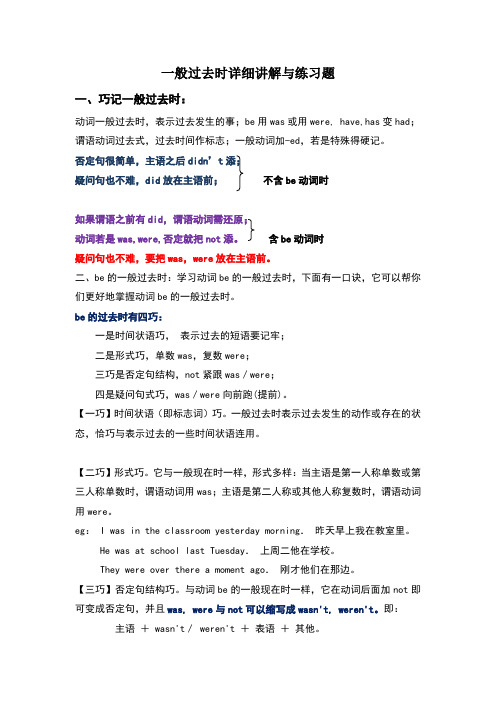
一般过去时详细讲解与练习题一、巧记一般过去时:动词一般过去时,表示过去发生的事;be用was或用were, have,has变had;谓语动词过去式,过去时间作标志;一般动词加-ed,若是特殊得硬记。
否定句很简单,主语之后didn’t添;疑问句也不难,did放在主语前;不含be动词时如果谓语之前有did,谓语动词需还原;动词若是was,were,否定就把not添。
含be动词时疑问句也不难,要把was,were放在主语前。
二、be的一般过去时:学习动词be的一般过去时,下面有一口诀,它可以帮你们更好地掌握动词be的一般过去时。
be的过去时有四巧:一是时间状语巧,表示过去的短语要记牢;二是形式巧,单数was,复数were;三巧是否定句结构,not紧跟was/were;四是疑问句式巧,was/were向前跑(提前)。
【一巧】时间状语(即标志词)巧。
一般过去时表示过去发生的动作或存在的状态,恰巧与表示过去的一些时间状语连用。
【二巧】形式巧。
它与一般现在时一样,形式多样:当主语是第一人称单数或第三人称单数时,谓语动词用was;主语是第二人称或其他人称复数时,谓语动词用were。
eg: I was in the classroom yesterday morning.昨天早上我在教室里。
He was at school last Tuesday.上周二他在学校。
They were over there a moment ago.刚才他们在那边。
【三巧】否定句结构巧。
与动词be的一般现在时一样,它在动词后面加not即可变成否定句,并且was, were与not可以缩写成wasn't, weren't。
即:主语+ wasn't/ weren't +表语+其他。
例如:I was not (=wasn't) here yesterday.昨天我不在这儿。
My parents were not (=weren't) at home last Sunday.上周日我父母不在家。
(完整版)一般过去时句型转换
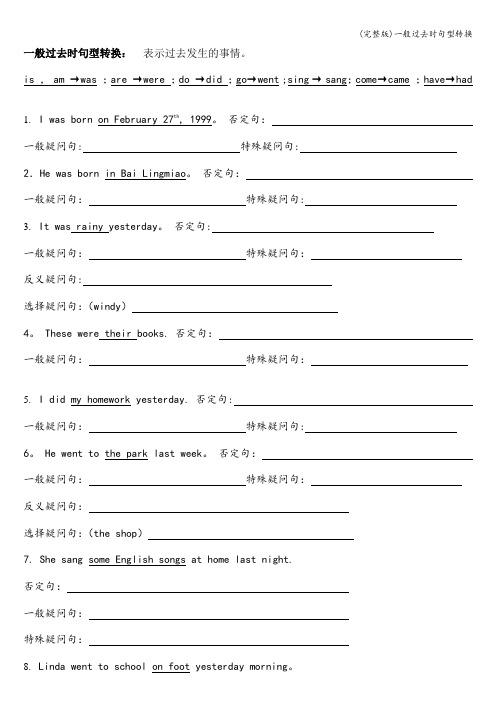
一般过去时句型转换:表示过去发生的事情。
is , am →was ;are →were ;do →did ;go→went ;sing → sang;come→came;have→had1.I was born on February 27th, 1999。
否定句:一般疑问句: 特殊疑问句:2.He was born in Bai Lingmiao。
否定句:一般疑问句:特殊疑问句:3.It was rainy yesterday。
否定句:一般疑问句:特殊疑问句:反义疑问句:选择疑问句:(windy)4。
These were their books. 否定句:一般疑问句:特殊疑问句:5.I did my homework yesterday. 否定句: 一般疑问句:特殊疑问句:6。
He went to the park last week。
否定句:一般疑问句:特殊疑问句:反义疑问句:选择疑问句:(the shop)7. She sang some English songs at home last night.否定句:一般疑问句:特殊疑问句:8.Linda went to school on foot yesterday morning。
否定句:一般疑问句:特殊疑问句:反义疑问句:选择疑问句:(by bike)9.They lived in a big house 10 years ago. 否定句: 一般疑问句:特殊疑问句:10.The twins liked swimming last year. 否定句: 一般疑问句:特殊疑问句:反义疑问句:选择疑问句:(running)11.There used to be lots of flowers in the garden years ago.否定句:一般疑问句:特殊疑问句:。
小学英语一般过去时

英语一般过去时定义表示在的过去某个时间里所发生的动作或存在的状态。
构成一般过去时的句式变化1.陈述句:主语+动词过去式+其他I saw the rianbow yesterday.我昨天看到了彩虹。
They went to he park last Sunday.上周日他们去了公园。
Ben got up at six this morning.本今天早上是六点起床的。
2.一般疑问句1)将be动词提到句首陈述句:It was an egg yesterday.它昨天还是一个蛋。
一般疑问句:Was it an egg yesterday?它昨天还是一个蛋吗?陈述句:They were at school just now.他们刚才还在学校。
一般疑问句:Were they at school just now?他们刚才还在学校吗?Linda老师的小提醒主语是第一人称和第二人称的句子,其过去时变化时,要注意be动词的变化。
一般疑问句:Were you at home last night?你昨天晚上在家吗?肯定回答:Yes,I was.否定回答:No,I wasn't.2)用助动词did陈述句:I did my homework at school,我在学校做了作业。
一般疑问句:Did you do your homework at school?你在学校做作业了吗?陈述句:They played basketball just now.他们刚才打了篮球。
一般疑问句:Did they play basketball just now?他们刚才打篮球了吗?小提醒由过去时态的陈述句变一般疑问句时,变化技巧上可以用拆分法,将动词过去式拆分为did+动词原形,然后将did提到句首,这样就不容易发生错误。
He slept a whole day.他睡了一整天。
第一步:先将slept拆分为did sleep第二步:将did提到句首变成:Did he sleep a whole day?他睡了一整天吗?3.否定句1)在be动词后面+not陈述句:I was a teacher twenty years ago.我20年前是一名老师。
完整版)一般过去时句型转换

完整版)一般过去时句型转换1.I was born on February 27th。
1999. Negative: I was not born on February 27th。
1999. n: Were you born on February 27th。
1999? Special n: When were you born?2.He was born in XXX.Negative: He was not born in XXX.n: XXX?Special n: Where was he born?3.It XXX.Negative: It was not rainy XXX.n: XXX?Special n: What was the weather like yesterday? XXX: It XXX。
wasn't it?Choice n: Was it windy yesterday?4.These were their books.Negative: These were not their books.n: XXX?Special n: XXX?5.XXX.Negative: I did not do my XXX.n: Did you do your homework yesterday?Special n: What did you do yesterday?6.He went to the park last week.Negative: He did not go to the park last week.n: Did he go to the park last week?Special n: Where did he go last week?XXX: He went to the park last week。
didn't he?Choice n: Did he go to the shop last week?7.XXX.Negative: She did not sing any English songs at home last night.n: Did she sing any English songs at home last night?Special n: XXX?8.Linda went to school on foot XXX.Negative: Linda did not go to school on foot XXX.n: Did Linda go to school on foot yesterday morning?Special n: How did Linda go to school yesterday morning?XXX: XXX't go to school on foot yesterday morning。
小学一般过去式句型转换
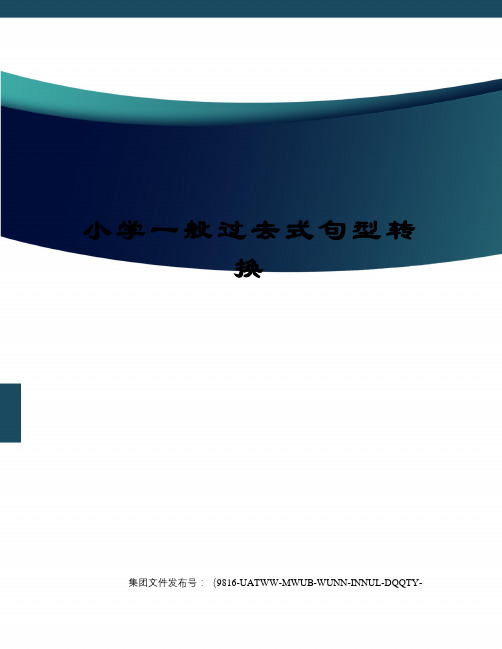
小学一般过去式句型转换集团文件发布号:(9816-UATWW-MWUB-WUNN-INNUL-DQQTY-一般过去时详细讲解与练习题一、巧记一般过去时:动词一般过去时,表示过去发生的事;be用was或用were, have,has变had;谓语动词过去式,过去时间作标志;一般动词加-ed,若是特殊得硬记。
否定句很简单,主语之后didn’t添;疑问句也不难,did放在主语前;不含be动词时如果谓语之前有did,谓语动词需还原;动词若是was,were,否定就把not添。
含be动词时疑问句也不难,要把was,were放在主语前。
二、be的一般过去时:学习动词be的一般过去时,下面有一口诀,它可以帮你们更好地掌握动词be的一般过去时。
be的过去时有四巧:一是时间状语巧,表示过去的短语要记牢;二是形式巧,单数was,复数were;三巧是否定句结构,not紧跟was/were;四是疑问句式巧,was/were向前跑(提前)。
【一巧】时间状语(即标志词)巧。
一般过去时表示过去发生的动作或存在的状态,恰巧与表示过去的一些时间状语连用。
【二巧】形式巧。
它与一般现在时一样,形式多样:当主语是第一人称单数或第三人称单数时,谓语动词用was;主语是第二人称或其他人称复数时,谓语动词用were。
eg: I was in the classroom yesterday morning.昨天早上我在教室里。
He was at school last Tuesday.上周二他在学校。
They were over there a moment ago.刚才他们在那边。
【三巧】否定句结构巧。
与动词be的一般现在时一样,它在动词后面加not即可变成否定句,并且was, were与not可以缩写成wasn't, weren't。
即:主语+ wasn't/ weren't +表语+其他。
例如:I was not (=wasn't) here yesterday.昨天我不在这儿。
小学一般过去式句型转换
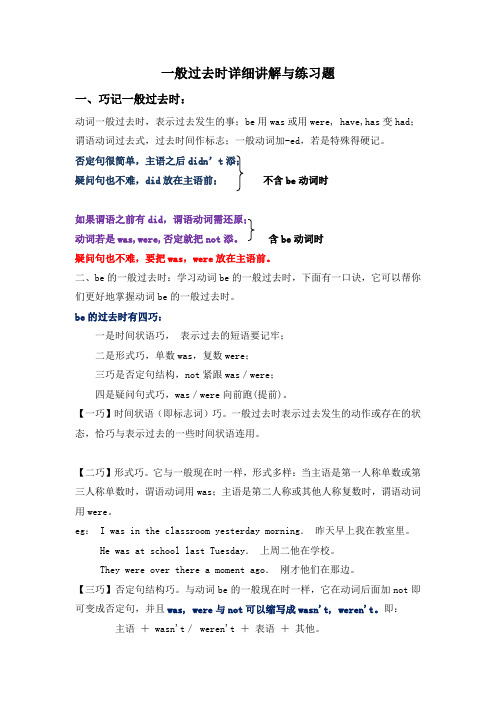
一般过去时详细讲解与练习题一、巧记一般过去时:动词一般过去时,表示过去发生的事;be用was或用were, have,has变had;谓语动词过去式,过去时间作标志;一般动词加-ed,若是特殊得硬记。
否定句很简单,主语之后didn’t添;疑问句也不难,did放在主语前;不含be动词时如果谓语之前有did,谓语动词需还原;动词若是was,were,否定就把not添。
含be动词时疑问句也不难,要把was,were放在主语前。
二、be的一般过去时:学习动词be的一般过去时,下面有一口诀,它可以帮你们更好地掌握动词be的一般过去时。
be的过去时有四巧:一是时间状语巧,表示过去的短语要记牢;二是形式巧,单数was,复数were;三巧是否定句结构,not紧跟was/were;四是疑问句式巧,was/were向前跑(提前)。
【一巧】时间状语(即标志词)巧。
一般过去时表示过去发生的动作或存在的状态,恰巧与表示过去的一些时间状语连用。
【二巧】形式巧。
它与一般现在时一样,形式多样:当主语是第一人称单数或第三人称单数时,谓语动词用was;主语是第二人称或其他人称复数时,谓语动词用were。
eg: I was in the classroom yesterday morning.昨天早上我在教室里。
He was at school last Tuesday.上周二他在学校。
They were over there a moment ago.刚才他们在那边。
【三巧】否定句结构巧。
与动词be的一般现在时一样,它在动词后面加not即可变成否定句,并且was, were与not可以缩写成wasn't, weren't。
即:主语+ wasn't/ weren't +表语+其他。
例如:I was not (=wasn't) here yesterday.昨天我不在这儿。
My parents were not (=weren't) at home last Sunday.上周日我父母不在家。
- 1、下载文档前请自行甄别文档内容的完整性,平台不提供额外的编辑、内容补充、找答案等附加服务。
- 2、"仅部分预览"的文档,不可在线预览部分如存在完整性等问题,可反馈申请退款(可完整预览的文档不适用该条件!)。
- 3、如文档侵犯您的权益,请联系客服反馈,我们会尽快为您处理(人工客服工作时间:9:00-18:30)。
一般过去时详细讲解与练习题一、巧记一般过去时:动词一般过去时,表示过去发生的事;be用was或用were, have,has变had;谓语动词过去式,过去时间作标志;一般动词加-ed,若是特殊得硬记。
否定句很简单,主语之后didn’t添;疑问句也不难,did放在主语前;不含be动词时如果谓语之前有did,谓语动词需还原;动词若是was,were,否定就把not添。
含be动词时疑问句也不难,要把was,were放在主语前。
二、be的一般过去时:学习动词be的一般过去时,下面有一口诀,它可以帮你们更好地掌握动词be的一般过去时。
be的过去时有四巧:一是时间状语巧,表示过去的短语要记牢;二是形式巧,单数was,复数were;三巧是否定句结构,not紧跟was/were;四是疑问句式巧,was/were向前跑(提前)。
【一巧】时间状语(即标志词)巧。
一般过去时表示过去发生的动作或存在的状态,恰巧与表示过去的一些时间状语连用。
【二巧】形式巧。
它与一般现在时一样,形式多样:当主语是第一人称单数或第三人称单数时,谓语动词用was;主语是第二人称或其他人称复数时,谓语动词用were。
eg:I was in the classroom yesterday morning.昨天早上我在教室里。
He was at school last Tuesday.上周二他在学校。
They were over there a moment ago.刚才他们在那边。
【三巧】否定句结构巧。
与动词be的一般现在时一样,它在动词后面加not即可变成否定句,并且was, were与not可以缩写成wasn't, weren't。
即:主语+wasn't/weren't +表语+其他。
例如:I was not (=wasn't) here yesterday.昨天我不在这儿。
My parents were not (=weren't) at home last Sunday.上周日我父母不在家。
【四巧】疑问句式巧。
把was, were提到句首,句末用问号即可变为一般疑问句。
即:Was(Were) +主语+表语+其他?这恰巧与动词be的一般现在时的疑问句式相似。
例如:Were you at home the day before yesterday﹖前天你在家吗?Was she late this morning﹖今天早上她迟到了吗?更巧的是疑问句的答语也相似,肯定回答用“Yes, 主语+was/were.”;否定回答用“No,主语+wasn't/weren't.”。
eg:—Were Wei Hua and Han Mei here just now﹖刚才魏华和韩梅在这儿吗?—Yes, they were.(No, they weren't.) 是的,她们在。
(不,她们不在。
)动词过去式变化规则:1.一般在动词末尾加-ed,如:pull-pulled, cook-cooked2.结尾是e加d,如:taste-tasted3.末尾只有一个元音字母和一个辅音字母的重读闭音节,应双写末尾的辅音字母,再加-ed,如:stop-stopped4.以“辅音字母+y”结尾的,变y为i,再加-ed,如:study-studied5.不规则动词过去式:am,is-was are-were do-did see-saw say-said give-gave get-got go-went come-came have-had eat-ate take-took run-ran sing-sang put-put make-made read-read write-wrote draw-drew drink-drank fly-flew ride-rode speak-spoke sweep-swept swim-swam sit-sat一、句型转换1. The children had a good time in the park.否定句:__________________________________________ 一般疑问句:__________________________________________ 对划线部分提问:__________________________________________ 2. There were about nine hundred people at the concert.(音乐会)否定句:__________________________________________ 一般疑问句:__________________________________________对划线部分提问:__________________________________________3. Ann did her homework yesterday evening.否定句:__________________________________________ 一般疑问句:__________________________________________ 对划线部分提问:__________________________________________ 4. Last week I read an English book.否定句:__________________________________________ 一般疑问句:___________________________________________ 肯定/否定回答:__________________________________________ 对划线部分提问:__________________________________________ 5. My brother was in the park just now.否定句:__________________________________________ 一般疑问句:__________________________________________ 肯定/否定回答:___________________________________________ 对划线部分提问:____________________________________6. She had some bread for lunch yesterday.否定句:__________________________________________一般疑问句:________________________________________肯定/否定回答:____________________________________对划线部分提问:____________________________________*7. They read English last night.否定句:__________________________________________一般疑问句:________________________________________ 肯定/否定回答:____________________________________ 对划线部分提问:____________________________________8. I was born in 2007.否定句:_____________________________________________一般疑问句:_________________________________________对划线部分提问:_____________________________________二、写出下列动词的过去式Is_______ are ________have _________want _______hear________ Sit_______ watch _______play ______ enjoy _______do________ study ______dance _______like_______ live ________go ______ buy ______ eat______ get _______ walk ______take______put _______run______ come_______ become________ fly________ swim_______ find _______ begin______三、请用正确动词形式填空。
1. I _________ (have) an exciting party last weekend.2. _________ she _________(practice) her guitar yesterday?No, she _________.3. What ________ Tom ________ (do) on Saturday evening?He ________(watch) TV and __________(read) an interesting book.4. They all _________(go) to the mountains yesterday morning.5. She _________(not visit) her aunt last weekend.She ________ (stay) at home and _________(do) some cleaning.6. When ________ you _________(write) this song? I __________(write) it last year.7. My friend, Carol, ________(study) for the math test and ________(practice) English last night.8. ________ Mr. Li __________(do) the project on Monday morning? Yes, he _________.9. How _________(be) Jim's weekend? It _________(be not) bad.10. ________ (be) your mother a sales assistant last year? No. she __________.四、改错题.1.How is Jane yesterday? _____________________2.He go to school by bus last week. ____________________________ 3.He often goes home at 6:00 last month. _______________________ 4.I can fly kites seven years ago. ______________________________ 5.Did you saw him just now?__________________________________ 6.Tom wasn’t watch TV last night. ______________________________ 7.I didn’t my homework yesterday. _____________________________ 8.He wait for you three hours ago. ______________________________如有侵权请联系告知删除,感谢你们的配合!。
